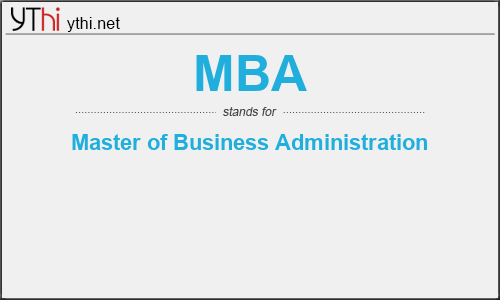What does MBA mean? What is the full form of MBA?
The full form of MBA is Master of Business Administration.
A master of business administration (MBA) sharpens the skills of aspiring managers and business professionals. The MBA dates back to the early 20th century. As the nation was becoming increasingly industrialized, companies were in need of professionals with strong management skills to lead administrative operations and corporate initiatives in the workforce. The world’s first MBA degree — offered by Harvard University in 1908 — approached the concept of management from a scientific point of view; the degree identified a uniform set of skills to standardize the training for business administrators in any industry or field.
MBA is the common abbreviation for a Master of Business Administration degree, and recipients of this degree typically stop attending school after receiving it.
However, those who are interested in conducting business research may elect to pursue a doctorate in business or management. Such students can earn either a Ph.D. or a Doctor of Business Administration degree, commonly known as a DBA.
A full-time MBA program typically lasts two years, though there are many accelerated full-time MBA programs that only last a single year, especially at non-U.S. business schools, where this fast-paced type of MBA is common.
Part-time and executive MBA programs vary in length, depending on how many credits a student enrolls in each academic semester or quarter. Both executive and part-time MBA programs are designed for working professionals who are attending school while maintaining a full-time job.
MBA applications typically include standardized test scores, resumes, academic transcripts, essays and recommendation letters.
Many B-schools will accept either GMAT or GRE test scores. However, there are a few test-optional MBA programs where applicants do not need to submit business school entrance exam scores. Additionally, some B-schools that ordinarily require test scores will waive that requirement for applicants who qualify for score waivers based on impressive work experience or a solid college GPA.
B-schools occasionally invite applicants for in-person interviews and sometimes require applicants to submit video essays. And most MBA programs prefer MBA applicants who have significant work experience, though there are some programs designed for college students or recent college graduates.
MBA admissions officers generally like to see evidence of career progression in an MBA application, meaning that the applicant gradually took on more professional responsibility. It’s also helpful if applicants have success stories about how they were able to contribute to their current company, past employers, college campus or local community, experts say.
MBA
means
Master of Business Administration![]()
Translate Master of Business Administration to other language.


Leave a Reply
You must be logged in to post a comment.